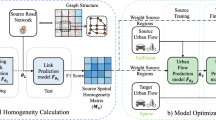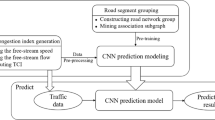Abstract
Traffic flow prediction often requires much training data for effective supervised training, which is a shackle for applying smart transportation management in many developing cities with deficient urban infrastructures. Although urban transfer learning has received some attention to date, there still remain unaddressed challenges, i.e., data scarcity of the target city and cross-city cross-mode data heterogeneity, which will cause the insufficient transferability of regional features. To alleviate theses challenges, we propose Cross-city Region Adaptive Prediction by Exploring Pattern Idealized Correlation named CrapEpic. Firstly, regarding the data scarcity, we investigate a data enhancement method that generates conjugate traffic flow data in both the target and source cities through flow pattern folding. Secondly, to mitigate the data heterogeneity issue, we design a multi-layer regional match function based on the shared knowledge to filter the transferable regional traffic flow. Finally, we propose a conjugate traffic flow transfer learning model to extract the shared knowledge from idealized regional match for cross-city cross-mode traffic flow prediction. Extensive experiments on real-world datasets of three cities demonstrate that CrapEpic outperforms the state-of-the-art baselines.
Access this chapter
Tax calculation will be finalised at checkout
Purchases are for personal use only
Similar content being viewed by others
References
A, J.E., R, C.C.: Traffic incident detection and modelling using quantum frequency algorithm and autoregressive integrated moving average models, pp. 1–6. IEEE (2013)
Atluri, G., Karpatne, A., et al: Spatio-temporal data mining: a survey of problems and methods. ACM Comput. Surv. 51(4), 83:1–83:41 (2018)
Chen, Y., Gu, J., et al: Exploiting hierarchical correlations for cross-city cross-mode traffic flow prediction, pp. 891–896. ICDM (2022)
Fan, X., Xiang, C., et al.: Buildsensys: reusing building sensing data for traffic prediction with cross-domain learning. IEEE Trans. Mob. Comput. 20(6), 2154–2171 (2021)
Fang, S., Zhang, Q., et al: Gstnet: global spatial-temporal network for traffic flow prediction, pp. 2286–2293. ijcai.org (2019)
Fang, X., Huang, J., et al: Constgat: Contextual spatial-temporal graph attention network for travel time estimation at baidu maps, pp. 2697–2705. ACM (2020)
Huang, X., Zhang, B., Feng, S., Ye, Y., Li, X.: Interpretable local flow attention for multi-step traffic flow prediction. Neural Netw. 161, 25–38 (2023)
Jiang, J., Han, C., Zhao, W.X., Wang, J.: Pdformer: Propagation delay-aware dynamic long-range transformer for traffic flow prediction, pp. 4365–4373. AAAI Press (2023)
Li, H., Jin, D., Li, X., Huang, J., Ma, X., Cui, J., Huang, D., Qiao, S., Yoo, J.: Dmgf-net: an efficient dynamic multi-graph fusion network for traffic prediction. ACM Trans. Knowl. Discov. Data 17(7), 97:1–97:19 (2023)
Li, P., Fang, J., Chen, W., Liu, A., Chao, P.: Adversarial spatial-temporal graph network for traffic speed prediction with missing values. In: International Conference on Database Systems for Advanced Applications. pp. 380–395. Springer (2023)
Li, R., He, H., Wang, R., Huang, Y., Liu, J., Ruan, S., He, T., Bao, J., Zheng, Y.: Just: Jd urban spatio-temporal data engine. In: 2020 IEEE 36th International Conference on Data Engineering (ICDE), pp. 1558–1569. IEEE (2020)
Shen, B., Liang, X., et al: Stepdeep: a novel spatial-temporal mobility event prediction framework based on deep neural network, pp. 724–733. ACM (2018)
Shi, X., Chen, Z., et al: Convolutional LSTM network: A machine learning approach for precipitation nowcasting. pp. 802–810 (2015)
Wang, L., Geng, X., et al: Cross-city transfer learning for deep spatio-temporal prediction, pp. 1893–1899. ijcai.org (2019)
Wang, L., Geng, X., et al.: Ridesharing car detection by transfer learning. Artif. Intell. 273, 1–18 (2019)
Wang, S., Miao, H., et al.: Spatio-temporal knowledge transfer for urban crowd flow prediction via deep attentive adaptation networks. IEEE Trans. Intell. Transp. Syst. 23(5), 4695–4705 (2022)
Xie, P., Li, T., et al.: Urban flow prediction from spatiotemporal data using machine learning: A survey. Inf. Fusion 59, 1–12 (2020)
Yao, Z., Wang, Y., et al: Unsupervised transfer learning for spatiotemporal predictive networks. In: Proceedings of Machine Learning Research, vol. 119, pp. 10778–10788. PMLR (2020)
Yuan, Z., Zhou, X., et al: Hetero-convlstm: A deep learning approach to traffic accident prediction on heterogeneous spatio-temporal data, pp. 984–992. ACM (2018)
Zhang, J., Zheng, Y., et al: Deep spatio-temporal residual networks for citywide crowd flows prediction, pp. 1655–1661. AAAI Press (2017)
Zhang, Y., Li, Y., Zhou, X., Kong, X., Luo, J.: Strans-gan: Spatially-transferable generative adversarial networks for urban traffic estimation. pp. 743–752. IEEE (2022)
Zhou, Q., Gu, J., et al: Modeling heterogeneous relations across multiple modes for potential crowd flow prediction, pp. 4723–4731. AAAI Press (2021)
Acknowledgments
This research is supported in part by the National Natural Science Foundation of China (Grant No. 62072235).
Author information
Authors and Affiliations
Corresponding author
Editor information
Editors and Affiliations
Rights and permissions
Copyright information
© 2024 The Author(s), under exclusive license to Springer Nature Singapore Pte Ltd.
About this paper
Cite this paper
Shi, G., Zhou, Q., Gu, J. (2024). Exploring Idealized Regional Match for Cross-City Cross-Mode Traffic Flow Prediction. In: Onizuka, M., et al. Database Systems for Advanced Applications. DASFAA 2024. Lecture Notes in Computer Science, vol 14850. Springer, Singapore. https://doi.org/10.1007/978-981-97-5552-3_4
Download citation
DOI: https://doi.org/10.1007/978-981-97-5552-3_4
Published:
Publisher Name: Springer, Singapore
Print ISBN: 978-981-97-5551-6
Online ISBN: 978-981-97-5552-3
eBook Packages: Computer ScienceComputer Science (R0)




